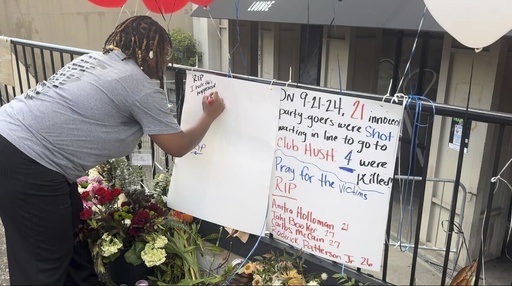MONTGOMERY, Ala. — Following a tumultuous year filled with numerous mass shootings throughout Alabama, Governor Kay Ivey, along with lawmakers from both the Republican and Democratic parties, is advocating for a ban on Glock switches and other modification devices that allow semi-automatic firearms to function as fully automatic weapons.
Ivey is slated to introduce this legislative initiative on Tuesday during her State of the State speech, as part of a comprehensive package aimed at enhancing public safety, as Alabama seeks to align itself with around twenty other states that have already implemented similar prohibitions.
Nationwide, communities have faced devastating incidents involving these conversion devices—small attachments made of metal or plastic that can easily be ordered online or fabricated using 3D printing technology. These devices enable semi-automatic guns to fire multiple rounds with a single trigger pull, which has led to increased casualties in gun-related incidents. Although Democrats in Alabama have consistently advocated for the ban on such devices, previous legislative attempts have fallen short in a Republican-majority legislature that has historically resisted imposing stricter gun control measures.
“Governor Ivey is determined to ensure that dangerous Glock switches do not end up in the hands of gangs and criminals. Alongside this ban, she will introduce additional public safety measures designed to support law enforcement and mitigate crime. We anticipate bipartisan backing for this initiative,” stated Ivey’s spokesperson, Gina Maiola.
The urgency of such a ban has been underscored by violent occurrences, including a shooting in September that resulted in the deaths of four individuals outside a lounge in Birmingham. Law enforcement officials have attributed this horrific incident to the rapid-fire capabilities enabled by these devices. Birmingham’s Mayor Randall Woodfin emphasized the severity of the issue, declaring Glock switches to be the paramount public safety concern for both the city and the state.
While these conversion devices are already prohibited under federal statutes and in 23 states as reported by anti-violence organization Everytown for Gun Safety, proponents of the state-level ban argue that it would empower district attorneys to pursue charges more effectively, rather than needing to defer to federal prosecutors.
Democratic Representative Phillip Ensler from Montgomery has filed legislation once more aiming to classify possession of these devices as a Class C felony, which could result in up to ten years in prison. “These devices cause chaos. Though we cannot restore lost lives, we can work towards saving future ones,” he stated.
Last year, Ensler’s bill made it through the House of Representatives; however, the legislative session concluded without a Senate vote. House Speaker Nathaniel Ledbetter believes that this year could see final passage. Nonetheless, Senate Rules Chairman Jabo Waggoner, a Republican, warned that opposition still exists.
“It’s going to be a challenging path,” Waggoner said.
Attempts to ban these devices have yielded inconsistent outcomes across different states. Mississippi and Maryland recently enacted similar bans, while Pennsylvania faced a setback, with a proposal to outlaw “multi-burst trigger activators” falling short by a single vote in the House after a unified Republican opposition and one Democratic dissent. Other states, including Alabama, Utah, Colorado, and Virginia, are anticipated to introduce proposals targeting such conversions, according to Everytown for Gun Safety.
Alabama ranks among the highest in gun violence rates across the nation, recording 1,278 gun-related fatalities in 2022, placing it fourth in the U.S. for gun death rates, trailing only Mississippi, Louisiana, and New Mexico.
“Residents in states with lax gun laws have continually suffered the consequences associated with Glock switches,” asserted Olivia Li, Policy Counsel for Everytown for Gun Safety.
John Commerford, the executive director of the NRA Institute for Legislative Action, highlighted that the possession of conversion devices is already a felony on a federal level, with stringent mandatory sentences applicable in cases of violent crime.
“Currently, U.S. Attorneys possess the means to deter the misuse of these devices through prosecution,” Commerford explained.
The anticipated ban on conversion devices is projected to be just one element of a broader Alabama legislative agenda focusing on public safety. Other proposals expected for consideration include enhanced incentives for local law enforcement staffing and electronic monitoring of juvenile defendants to ensure compliance with bond terms. Additionally, the “second chance” bill aims to permit judges to reassess sentences for non-violent offenders sentenced to life under Alabama’s habitual offender statute.
Some Democratic legislators argue that more substantial measures are necessary to address gun violence in the state. House Democrats have called for the reinstatement of permit requirements for carrying concealed weapons, which were abolished in 2023.
“It is critical to set aside political rhetoric and take decisive action to address this pressing problem,” Ensler expressed.
While there exists some bipartisan consensus regarding the ban on conversion devices, Republicans, who dominate both legislative chambers, remain largely unsupportive of additional gun restrictions. As Ledbetter summarized, “Ultimately, it’s not about the guns; it’s about the individuals.”




